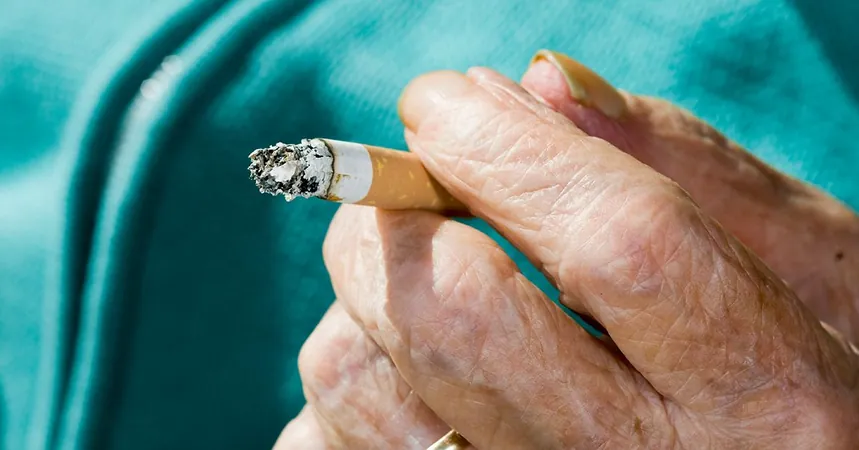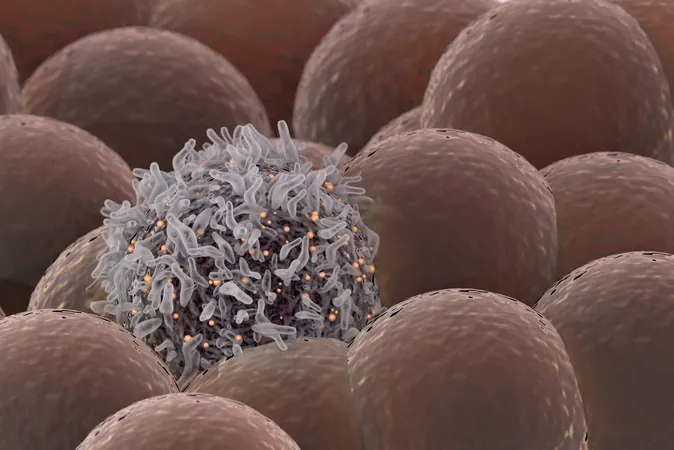
Revealed: How Cigarette Smoking Fuels Pancreatic Cancer—What You Must Know!
2025-09-11
Author: Arjun
Unlocking the Mystery Behind Smoking and Pancreatic Cancer
For years, the correlation between smoking and pancreatic cancer has been evident, but the underlying reasons have remained elusive until now. A groundbreaking study from the University of Michigan has finally shed light on how chemicals in cigarette smoke can hinder our immune system's ability to fight tumors.
The Startling Findings of the Study
Published in Cancer Discovery, the study reveals that certain components in cigarette smoke, specifically a group of chemicals known as aryl hydrocarbon receptor ligands (AhRLs), alter immune responses in a way that promotes the growth and spread of pancreatic cancer. This research opens the door to potential new treatments targeting this mechanism, especially significant given the dire prognosis associated with pancreatic cancer—a mere 13% survival rate over five years.
A Closer Look at the Research Methodology
The research involved a multi-faceted approach, combining lab experiments with mouse models and human tissue samples. Mice were exposed to either cigarette smoke extract or a toxic compound called TCDD, a powerful AhR ligand. They then observed the growth of implanted pancreatic cancer cells and how immune cells reacted to the smoke-related chemicals.
Understanding the Immune Response Shift
The results were alarming: both cigarette smoke and TCDD accelerated tumor growth, but only when the immune systems of the mice were intact. This indicates that the smoke did not directly harm tumor cells; instead, it reprogrammed immune cells to become less effective at combating cancer.
Crucially, a receptor on CD4+ T cells was activated, leading to an increase in IL-22 production and regulatory T cells (Tregs). While Tregs usually help keep immune responses in check, in this case, they hindered the action of CD8+ T cells, which are typically tasked with attacking cancer cells.
What This Means for Smokers and Public Health
The implications are profound—not only does smoking potentially kickstart pancreatic cancer development, but the study also highlights the need for urgent smoking cessation efforts. Health experts note that in 2025, over 67,000 Americans are expected to be diagnosed with pancreatic cancer, with almost 52,000 expected deaths. As such, quitting smoking could significantly reduce this risk and improve overall health.
Expert Opinions on Smoking Cessation
Experts like Dr. Asfar Azmi from the Karmanos Cancer Institute caution that while this study is a critical step forward, it's essential to continue research before it can directly influence cancer treatment practices. Dr. Najeeb Al Hallak emphasizes that quitting smoking is one of the most impactful decisions individuals can make to lower their pancreatic cancer risk.
Take Action Now: Resources for Quitting Smoking
If you're a smoker, know that resources are available to help you quit. Programs like 1-800-QUIT-NOW and websites such as Smokefree.gov offer valuable support. Remember, quitting may be tough but is entirely achievable—many succeed each day, and every attempt gets you closer to your goal.
To sum it up: the connections between smoking and pancreatic cancer are clearer now than ever, reinforcing the message that quitting smoking can save lives!




 Brasil (PT)
Brasil (PT)
 Canada (EN)
Canada (EN)
 Chile (ES)
Chile (ES)
 Česko (CS)
Česko (CS)
 대한민국 (KO)
대한민국 (KO)
 España (ES)
España (ES)
 France (FR)
France (FR)
 Hong Kong (EN)
Hong Kong (EN)
 Italia (IT)
Italia (IT)
 日本 (JA)
日本 (JA)
 Magyarország (HU)
Magyarország (HU)
 Norge (NO)
Norge (NO)
 Polska (PL)
Polska (PL)
 Schweiz (DE)
Schweiz (DE)
 Singapore (EN)
Singapore (EN)
 Sverige (SV)
Sverige (SV)
 Suomi (FI)
Suomi (FI)
 Türkiye (TR)
Türkiye (TR)
 الإمارات العربية المتحدة (AR)
الإمارات العربية المتحدة (AR)